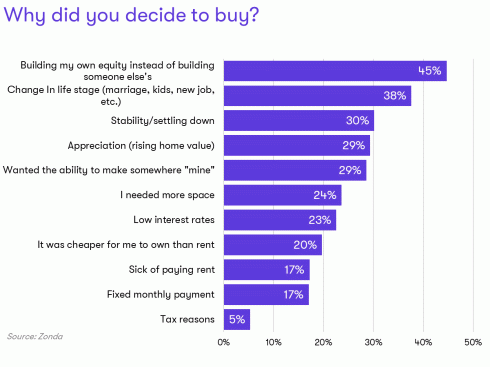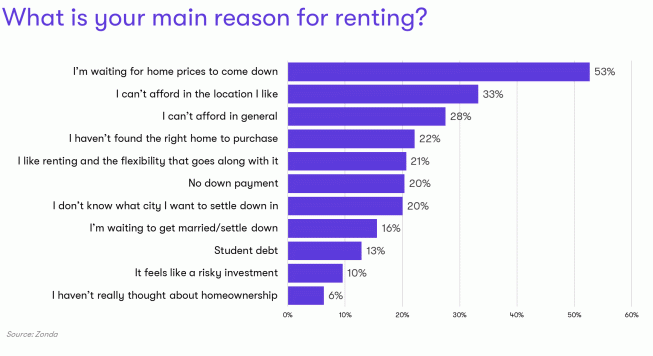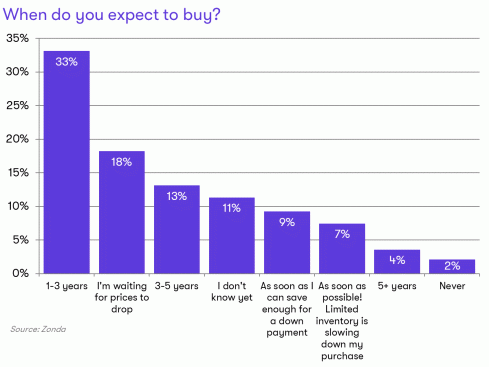Homeownership has traditionally been considered a key component of the “American dream.”
In fact, 98% of millennials want to become a homeowner at some point if they aren’t already, according to Zonda’s 6th annual millennial survey of more than 1,000 respondents across the country.
Millennials are the largest living generation in the U.S., and their decision to buy (or not) is the biggest potential tailwind (or headwind) to housing demand over the next few years.
Historically, the older the individual, the higher the homeownership rate. The trends we are seeing for millennials are no exception. Those younger than 35 have a homeownership rate of 39.3%, with that level reaching 62.5% for those 35 to 44, according to the U.S. Census Bureau. It is also not surprising that the homeownership rate is higher in more affordable housing markets across the country compared with more expensive ones.
With this in mind, we think it is important to understand why millennials end up buying but also why some are still renting. We turned to our survey for answers.

The top three reasons millennials gave for buying were related to wealth building, lifestyle, and settling down.
1. Building equity. Housing as an investment was the No. 1 reason why millennials reported they decided to buy. Building up equity can allow for wealth accumulation and enable generational transfer of wealth down the road. The idea of “paying yourself” instead of a landlord is an attractive selling proposition.
2. Change in life stage. The average American age for marriage was 30.4 for men and 28.6 for women as of 2021. Further, the median age for childbirth was 30. These numbers correspond well with the median millennial age of 32 today. Demographics alone offer reasons to be bullish about housing in the medium term.
3. Stability/settling down. As this cohort ages, many aspire to the same things prior generations wanted. For example, millennials noted stability/settling down as their third key reason behind their purchase. If you combined this response with the No. 5 reason of them wanting to make somewhere “theirs,” then stability would be the top reason why millennials decided to purchase a home.
As strong as the desire is to own, however, a recent study by ATTOM highlighted some of the current impediments to purchasing a home. First, the research noted it was cheaper to rent than buy in 95% of U.S. counties as of the beginning of 2023. Second, populous counties in large metro areas (such as Orange and Alameda counties in California) saw the largest affordability gaps between renting versus owning. Last, rents were growing faster than wages in 70% of counties, but this is still better than home prices versus wages with 90% of counties having higher price appreciation than wage growth.
Given this backdrop, Zonda asked millennials if they were willing to pay more for a monthly mortgage payment compared with rent given some of the longer-term benefits of homeownership. In response, 25% said they would be willing to pay an additional $500 per month to own versus rent, with 14% saying they would be willing to pay $1,000 or more per month. Note that this question asked “willing to” versus “able to,” and that distinction is important.

When we asked renters what their main reason for renting was, we had a surprising result this year—53% of respondents said they were waiting for prices to come down. Compare this with 5% of respondents that said this in 2021.
Many builders in the second half of last year adjusted their home prices down and/or increased incentives in response to the slower housing market. Zonda data from builders across the U.S. shows that about 70% of builders have already lowered prices compared with last year, 40% of which say their prices are down 5% to 15%. Early indications in 2023 are that some consumers on the sidelines have reentered the market in response.
Besides overall affordability, another reason millennials reported renting is that they haven’t found the right home to purchase. This response makes sense. On a national level, listings in January 2023 were down 45% compared with January 2019 as many existing homeowners are choosing to stay put.
Builders play an important role in this dynamic, though. New homes now make up about 30% of total inventory, up from 10% to 15% historically. More optionality could help get certain buyers into the market, especially if increased supply comes with slightly lower prices.
A third reason in favor of renting, and one that should not be ignored, is the simple idea that some people like the flexibility it provides. Whether it is the low-maintenance lifestyle, opportunity for luxury living, or another reason, renting offers a great alternative lifestyle compared with homeownership.

As we look ahead to the next few years, all eyes are on millennials. We found that 33% of millennials expect to buy a home in one to three years, which is the highest number we’ve captured in our six years of conducting this survey.
While homeownership isn’t for everyone, we are tracking the most effective ways to get these potential buyers to move in the face of economic uncertainty and strained housing affordability.



